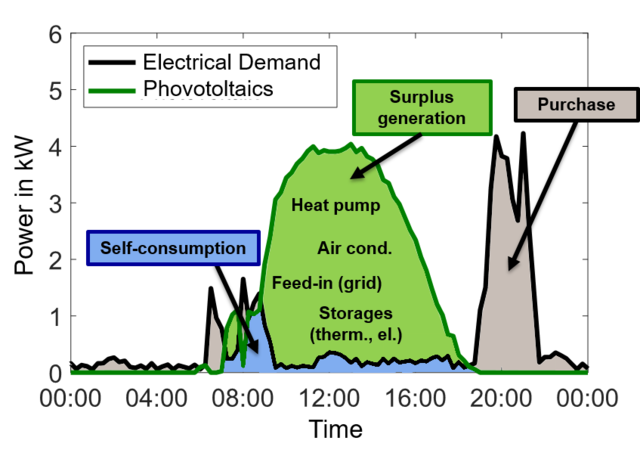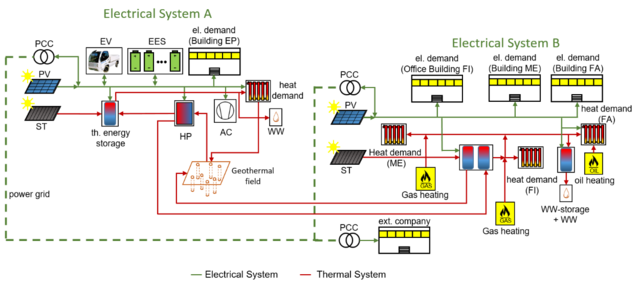Hybrid Energy Systems
The increasing share of decentralised energy generation and storage systems in the distribution networks, the integration of electric vehicles, the coupling of electrical and thermal systems, and the increasing and ease of use of Information and Communication Technologies (ICT) are leading to significant changes in the distribution networks and systems such as single-family houses, commercial and industrial buildings. Formerly consumers of energy and power, now become so-called prosumers (producers and consumers) who feed back, e.g. electrical energy into the grid at certain times. [1].

Fig.1: Generation/consumption of a prosumer
Hybrid energy systems are systems that combine cross-sectoral energy sources and supply systems as well as energy distribution and storage in a compact system. The aim is to substitute fossil energy sources with mainly renewably generated electricity or other renewable energy sources and sustainable forms of energy use. The basis of optimal and energy-efficient system design and operation is the knowledge of the interaction of the system components and their interdependencies [1].

Fig. 2: Overview of the sectors
The use of new meter functions and services (smart metering) enables market-dependent dynamic or special consumer and prosumer-oriented tariffs. In the simplest case, the consumer can be motivated to increase efficiency or to change consumption behaviour by the increased gain of information, e.g. taking into account the current tariff situation, own consumption or the costs related to it. Through the optimised use of decentralised generation systems (e.g. photovoltaic and solar thermal) and energy storage systems, the consumer or prosumer can react to dynamic tariffs if necessary and, for example, achieve the optimal economic or ecological benefits [1].
At the Institute of Electrical Power Systems, simulation models have been developed which can model, simulate and analyse hybrid energy systems.
These simulation models are used to determine the optimal use of decentralised energy generation and storage systems of optimising prosumers, taking into account the coupling of thermal and electrical systems. Using optimisation algorithms, the economic or ecological objectives of the prosumers are analysed, considering different desired energy services (heating, cooling, electrical energy services), external boundary conditions (e.g. building structure, weather) as well as selected energy- and power-based tariffs. Examples of such optimisation goals are listed below [1].
- Optimal use of generated energy for electricity and heat / air-conditioning
- Degree of autonomy / Degree of self-coverage
- Consideration of the capacities of the thermal and electrical grid connection
- Costs of operating the thermal and electrical grid connection
- Investment and operating costs of system components
- Variable purchase and sales tariffs for thermal and electrical energy
- Minimisation of greenhouse gas emissions
Research project: REsys – Regelungsstrategien zur Effizienzsteigerung komplexer hybrider Energiesysteme
Within the project “REsys - Regelungsstrategien zur Effizienzsteigerung komplexer hybrider Energiesysteme” – funded by the Austrian “Klima- und Energiefonds” as a part of the “Energieforschungsprogramm 2015” – models, simulations and analyses of an industrial company are built on measured and statistical data.

Fig. 3: Schematic representation of the analysed industrial company
The objectives of the project were:
- Improvement of the energy efficiency of future and existing complex hybrid energy systems.
- Generation of know-how regarding the interdependencies and interactions between components in such systems.
- Open up innovative methods for the analysis of big data, generated by a multitude of measuring sensors.
- Development of system-oriented simulation models with open system boundaries, validated by measured and statistical data.
Experimental, as well as virtual methods, were used. On the one hand, by using innovative measurement technologies to transform the real processes into data and to be able to map them in databases and, on the other hand, by creating a digital twin in the form of coupled simulation models to model the energy flows (electrical & thermal) mathematically.
The industrial company was analysed in advance in terms of energy and process orientation. All selected system components, the entire heat supply system and the electrical energy system were modelled and validated based on measurement data. Based on this, a sensitivity analysis regarding system dimensioning and control behaviour was carried out using variant calculations. The thermal simulation of the hybrid energy system was performed using a thermal building and system model. The electrical system is modelled together with a higher-level energy management system. An interface for the co-simulation between the thermal and electrical simulation models was established.
With REsys, the consortium achieved the development of a systematic understanding of the processes of energy flows in a complex, hybrid energy system. The physical data acquisition, the data analysis and the simulation of the complete system, as well as the possibility of scenario control, was created. These developed fundamentals should serve as a basis for future hybrid energy systems.
This project was funded by the Austrian “Klima- und Energiefonds” as a part of the “Energieforschungsprogramm” 2015.
References
[1] M. A. Lagler, „Dissertation: Influence of Optimizing Prosumers on Distribution Networks,“ Institut für Elektrische Anlagen und Netze der TU Graz, Graz, Österreich, 2020.
Publications
2020: Lagler, M. A., Schürhuber, R., Heimrath, R., Mach, T., Müller, M. J.
Interaction of hybrid energy systems with the power grid on the example of an industrial company
In: CIRED Workshop, Berlin, Deutschland, 2020, [Konferenz]
2020: Lagler, M. A., Schürhuber, R., Schmautzer, E., Heimrath, R., Mach, T., Müller, M. J.
Effizienzsteigerung in komplexen hybriden Energiesystemen am Beispiel eines Industriebetriebes
In: 16. Symposium Energieinnovation, Graz, Österreich, 2020, [Konferenz]
2019: Lagler, M. A., Schürhuber, R., Schmautzer, E.,
Influence of Optimizing Prosumers on Urban Distribution Networks
In: ETG-Kongress 2019, Esslingen am Neckar, Deutschland, 2019, [Konferenz]
2019: Lagler, M. A., Schmautzer, E., Schürhuber, R.,
Ökonomische und ökologische Optimierung eines hybriden Energiesystems am Beispiel eines Einfamilienhauses
In: 11. Internationale Energiewirtschaftstagung, Wien, Österreich, 2019, [Konferenz]
2018: Lagler, M. A., Schmautzer, E., Schürhuber, R.,
Sensitivities in Hybrid Energy Systems
In: 8th Solar Integration Workshop, Stockholm, Schweden, 2018, [Konferenz]
2018: Lagler, M. A., Schmautzer, E., Schürhuber, R., Lerch, W., Heimrath, R., Mach, T.,
Creation of a Hybrid Simulation Model
In: International Sustainable Energy Conference – ISEC 2018, Graz, Österreich, 2018, [Konferenz]
2017: Lagler, M. A., Schmautzer, E., Grobbauer, M., Gratzer, J., Michtner, G. M.,
Modellierung eines industriellen hybriden Energiesystems unter Einbeziehung dezentraler Energieerzeugung und -speicherung
In: 10. Internationale Energiewirtschaftstagung, Wien, Österreich, 2017, [Konferenz]
2016: Lagler, M. A., Schmautzer, E., Forsthofer, S.,
Modellierung eines hybriden Energiesystems unter Berücksichtigung dezentraler Energieerzeugung und -speicherung am Beispiel eines Einfamilienhauses mit Anbindung an das öffentliche Elektrizitätsnetz
In: Forum Econogy 2016, Linz, Österreich, 2016, [Konferenz]
| Contact |
| Facts
|
| Partners
|
